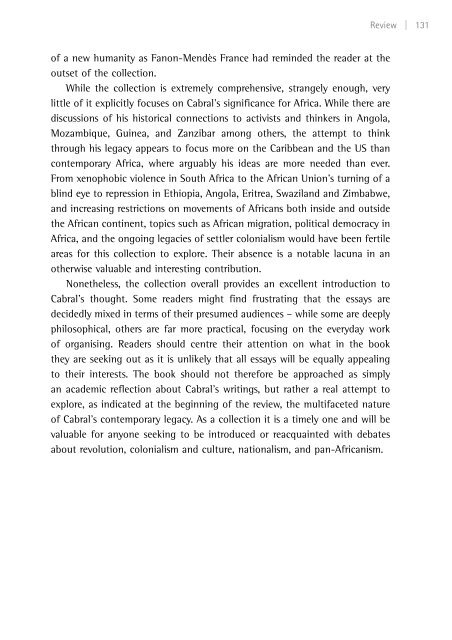Create successful ePaper yourself
Turn your PDF publications into a flip-book with our unique Google optimized e-Paper software.
of a new humanity as Fanon-Mendès France had reminded the reader at the<br />
outset of the collection.<br />
While the collection is extremely comprehensive, strangely enough, very<br />
little of it explicitly focuses on Cabral’s significance for Africa. While there are<br />
discussions of his historical connections to activists <strong>and</strong> thinkers in Angola,<br />
Mozambique, Guinea, <strong>and</strong> Zanzibar among others, the attempt to think<br />
through his legacy appears to focus more on the Caribbean <strong>and</strong> the US than<br />
contemporary Africa, where arguably his ideas are more needed than ever.<br />
From xenophobic violence in South Africa to the African Union’s turning of a<br />
blind eye to repression in Ethiopia, Angola, Eritrea, Swazil<strong>and</strong> <strong>and</strong> Zimbabwe,<br />
<strong>and</strong> increasing restrictions on movements of Africans both inside <strong>and</strong> outside<br />
the African continent, topics such as African migration, political democracy in<br />
Africa, <strong>and</strong> the ongoing legacies of settler colonialism would have been fertile<br />
areas for this collection to explore. Their absence is a notable lacuna in an<br />
otherwise valuable <strong>and</strong> interesting contribution.<br />
Nonetheless, the collection overall provides an excellent introduction to<br />
Cabral’s thought. Some readers might find frustrating that the essays are<br />
decidedly mixed in terms of their presumed audiences – while some are deeply<br />
philosophical, others are far more practical, focusing on the everyday work<br />
of organising. Readers should centre their attention on what in the book<br />
they are seeking out as it is unlikely that all essays will be equally appealing<br />
to their interests. The book should not therefore be approached as simply<br />
an academic reflection about Cabral’s writings, but rather a real attempt to<br />
explore, as indicated at the beginning of the review, the multifaceted nature<br />
of Cabral’s contemporary legacy. As a collection it is a timely one <strong>and</strong> will be<br />
valuable for anyone seeking to be introduced or reacquainted with debates<br />
about revolution, colonialism <strong>and</strong> culture, nationalism, <strong>and</strong> pan-<strong>Africanism</strong>.<br />
Review | 131


